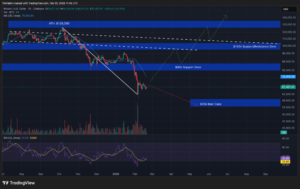Last updated:
 Why Trust Cryptonews
Why Trust Cryptonews

Key Takeaways:
- South Africa’s decentralized finance ecosystem shows promising growth trajectory, with projections reaching $180.7 million by 2028 according to official regulatory assessments.
- Regulatory authorities recognize DeFi’s potential to enhance financial access while expressing significant concerns about security vulnerabilities and consumer protection.
- Payment solutions and lending services emerge as the dominant use cases driving DeFi adoption among South Africans, particularly relevant in areas with limited traditional banking access.
- Regulatory sandboxes are being considered to test DeFi applications while developing appropriate oversight mechanisms to ensure sustainable growth.
A February 2025 study released by the Financial Sector Conduct Authority (FSCA) shows that the South African decentralized finance (DeFi) market is gaining traction, with transaction volumes expected to reach $2.8 million in 2025 and $180.7 million by 2028,
The study also highlighted retail customers as the main users, followed by small and medium-sized businesses.
South African DeFi Market: Opportunities and Challenges
In a February 20, 2025 statement, South Africa’s FSCA highlighted DeFi’s key benefits, stating that decentralized finance could improve financial inclusion and economic growth.
However, the FSCA warned of risks in the DeFi sector, noting that the lack of robust regulatory oversight and clear consumer protection measures could undermine market trust.
Fraudulent schemes and unstable platforms have already caused major setbacks globally, with users losing funds to hacks and poorly designed protocols.
In 2024, the crypto industry saw $1.49 billion in losses from hacks and fraud, but a recent Bybit hack, which nearly exceeded $1.5 billion, suggests an even worse trend for 2025.
Regulatory Measures Under Consideration
The FSCA emphasized that the lack of clear regulations and consumer protections weakens trust in the South African DeFi market.
To address these concerns, the FSCA is considering testing certain DeFi use cases in the Intergovernmental Fintech Working Group’s regulatory sandbox.
The regulator’s market study gathered insights from 21 crypto asset service providers, revealing that 38% of respondents believe the total value locked (TVL) in DeFi exceeds $27 million.
Meanwhile, 24% estimated the figure to be between $2.7 million and $27 million, while another 24% remained uncertain.
What Is Driving the DeFi Market Growth?
The study also examined the primary use cases driving DeFi adoption in South Africa. Payments were identified as the leading application at 52.38%, followed by lending and borrowing at 47.62%.
Other key DeFi applications include decentralized exchanges, tokenization, stablecoins, asset management, and staking.
Payments and lending are particularly relevant in a country where access to traditional banking services is often limited.
DeFi platforms offer an alternative by providing decentralized financial services accessible to anyone with an internet connection.
Looking ahead, several factors are expected to shape the growth of the South African DeFi market, including mainstream adoption of crypto assets, the emergence of new DeFi platforms, and the financial needs of underbanked populations.
The study showed that 62% of respondents believe mainstream adoption of crypto assets will be a major driver of DeFi expansion.
Additionally, 43% pointed to the emergence of new DeFi platforms as a growth factor.
The FSCA report aligns with a 2023 study by Chainalysis, which valued South Africa’s crypto asset industry at $26 billion, indicating the country’s valuable position in the global crypto sector.
South Africa’s DeFi and Crypto Market Soars Amidst Bitcoin Reserve Debates
While South Africa’s crypto and DeFi sector is expanding, the country’s stance remains cautious regarding Bitcoin’s role in national reserves.
In January 2025, the World Economic Forum in Davos became a stage for intense debates on whether Bitcoin should be integrated into national reserves.
South African Reserve Bank Governor Lesetja Kganyago pushed back against this notion.
Kganyago pointed to gold’s history as the foundation of the gold standard, where national currencies were once pegged to its value.
He argued that if Bitcoin were to be considered, then reserves in platinum, coal, or even agricultural commodities like beef or apples should be as well.
Kganyago made it clear that South Africa is unlikely to follow any country, including the U.S., in adopting Bitcoin as part of its reserves.
As South Africa’s DeFi market continues to expand, regulatory clarity will play a crucial role in shaping its trajectory.
While financial inclusion and digital asset adoption present significant opportunities, concerns around security and oversight remain key hurdles.
The coming years will determine whether South Africa can strike the right balance between innovation and regulation to establish a sustainable DeFi ecosystem.
Frequently Asked Questions (FAQs)
South Africa leads the continent in DeFi adoption due to its superior technical infrastructure and higher smartphone penetration. Nigeria and Kenya follow closely behind, with Nigeria showing faster growth rates in peer-to-peer transactions that could shift the continental landscape in coming years.
South Africa must balance encouraging innovation with protecting consumers in a market where approximately 23% of adults remain unbanked. The FSCA’s regulatory sandbox approach represents an attempt to craft contextually appropriate rules rather than importing Western regulatory models.
South Africa’s high income inequality could be partially addressed through DeFi platforms that remove traditional banking barriers like minimum balances and credit history requirements. Microlending protocols could provide essential capital to township and rural entrepreneurs who have historically lacked access to business financing.
ZAR-pegged stablecoins could significantly impact local DeFi adoption by addressing volatility concerns while maintaining blockchain benefits. These digital assets could become crucial for remittances, everyday payments, and as inflation hedges during currency fluctuations.

















